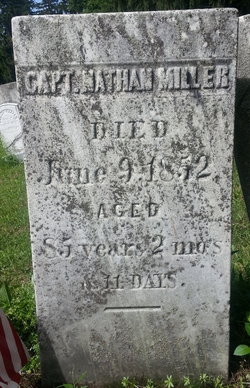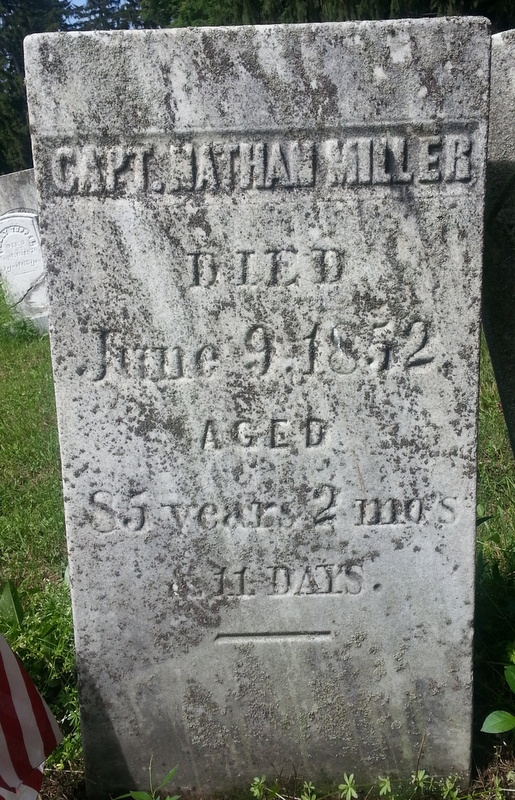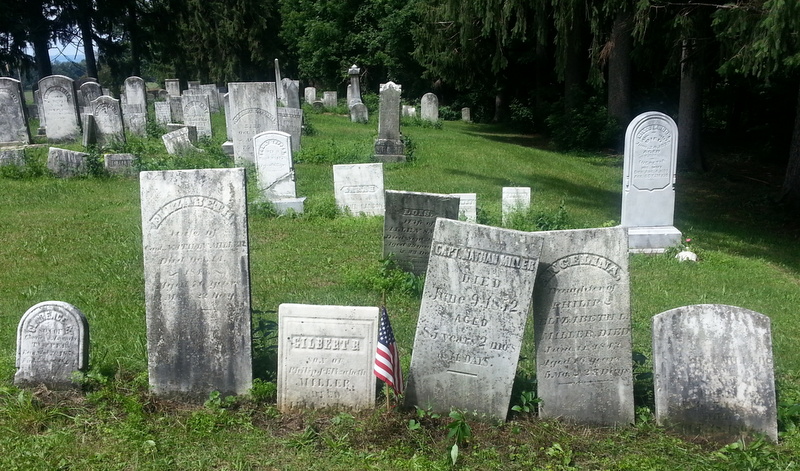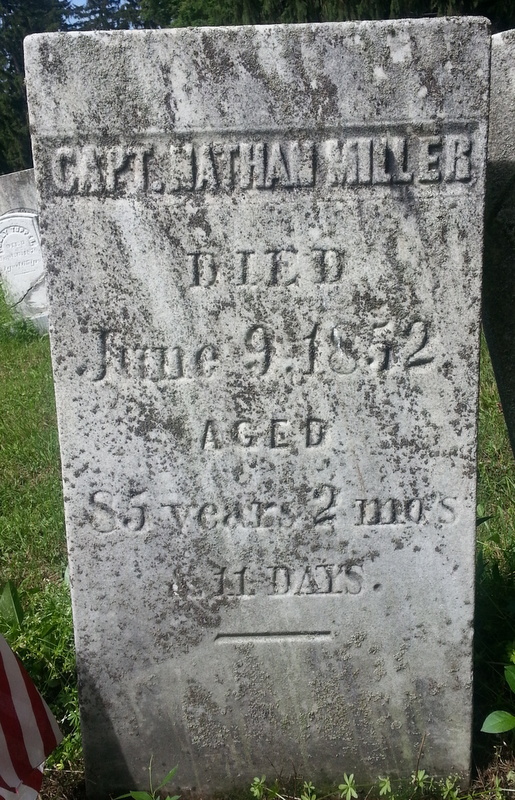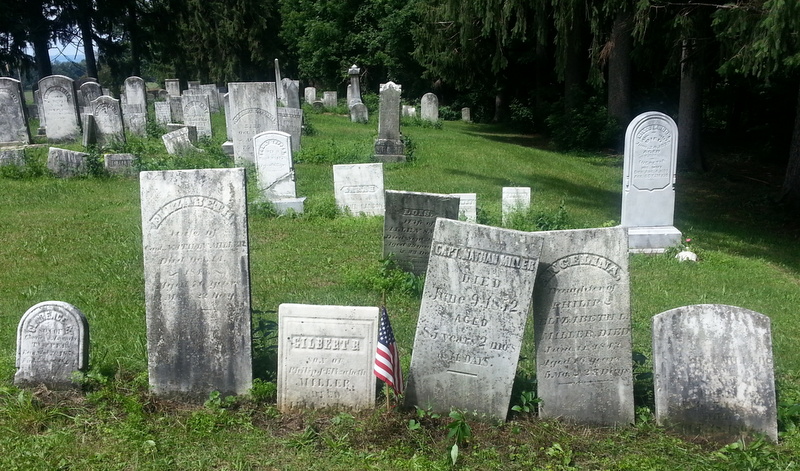No Venice in F.A.G. listing.
Nathan was born in Beekman, which became a precinct in 1737 and the first local government was formed. His granddaughter Elizabeth R. Peavey wrote that as a lad, shortly before the Revolutionary War, he often sat on a fence watching the first military company march by under the leadership of Col. Van Wyck of Beekman. During the Revolutionary War years, an important highway which transported men and supplies from New England passed through Beekman. Nathan bought a large farm adjoining the Brill farm, and his parents lived with him in their later years and died in his house. His granddaughter wrote that he was "trained to habits of industry on his father's farm..." Nathan and Elizabeth Baker were called "the handsomest couple that crossed the threshold of the Fishkill Baptist Church." In 1823, Nathan was an Overseer of the Poor along with Reed Crandall. An early Beekman record from the Town Clerk's office shows that they approved the manumission of a former slave named Harry. They certified that they were "personally acquainted with the said Harry, a colored man, and that we know him to be under the age of forty-five years and that he is of sufficient ability to provide for himself." Nathan is not listed on the Beekman 1790 census, so it's possible that he was living with his father, along with his wife, infant daughter, and 2 year old son, Nathan, Jr., who was born in Beekman. Since their daughter, Joann Miller was born in Beekman in 1802, it is assumed Nathan and his wife stayed in that town during those 12 years. Nathan was church chorister for many years, was an excellent singer, and "was often called upon to entertain others by his singing." He " built a large house after the then modern style of broad halls through the center and large, square rooms each side above and below, with the quaint oriel windows above at each end, and besides, a large basement kitchen connect with the cellar below on one side, which gave it an imposing appearance." His granddaughter wrote that Nathan and Elizabeth were "skilled in acquiring and saving and were successful in paying for their farm, notwithstanding they had a large family of children, 13 in all, 9 of whom lived to grow up to a good old age." Nathan acquired the title "Captain" which he carried throughout life after having been made Captain of the Militia Drill Co. formed immediately after the war. All able-bodied men were obliged to enter the militia by Law, but after several years it was disbanded. Nathan was so thrifty that he was able to retire from business at age 60 and live well. His two youngest sons, already married, lived on the farm and took care of the work. Also living about a mile from his farm, on the mountain, was a settlement of "colored people" and they were employed when extra help was needed on the farm. Elizabeth employed a professional weaver named "Knapp" who wove table linen, sheeting, bedspreads, and carpets of beautiful patterns. Elizabeth described her grandfather as a short man of 5'7", of stout build, very straight and very healthy. He was light complexion. Nathan and his wife are buried in Ledyard, NY in back of the Methodist Church (near Venice).
No Venice in F.A.G. listing.
Nathan was born in Beekman, which became a precinct in 1737 and the first local government was formed. His granddaughter Elizabeth R. Peavey wrote that as a lad, shortly before the Revolutionary War, he often sat on a fence watching the first military company march by under the leadership of Col. Van Wyck of Beekman. During the Revolutionary War years, an important highway which transported men and supplies from New England passed through Beekman. Nathan bought a large farm adjoining the Brill farm, and his parents lived with him in their later years and died in his house. His granddaughter wrote that he was "trained to habits of industry on his father's farm..." Nathan and Elizabeth Baker were called "the handsomest couple that crossed the threshold of the Fishkill Baptist Church." In 1823, Nathan was an Overseer of the Poor along with Reed Crandall. An early Beekman record from the Town Clerk's office shows that they approved the manumission of a former slave named Harry. They certified that they were "personally acquainted with the said Harry, a colored man, and that we know him to be under the age of forty-five years and that he is of sufficient ability to provide for himself." Nathan is not listed on the Beekman 1790 census, so it's possible that he was living with his father, along with his wife, infant daughter, and 2 year old son, Nathan, Jr., who was born in Beekman. Since their daughter, Joann Miller was born in Beekman in 1802, it is assumed Nathan and his wife stayed in that town during those 12 years. Nathan was church chorister for many years, was an excellent singer, and "was often called upon to entertain others by his singing." He " built a large house after the then modern style of broad halls through the center and large, square rooms each side above and below, with the quaint oriel windows above at each end, and besides, a large basement kitchen connect with the cellar below on one side, which gave it an imposing appearance." His granddaughter wrote that Nathan and Elizabeth were "skilled in acquiring and saving and were successful in paying for their farm, notwithstanding they had a large family of children, 13 in all, 9 of whom lived to grow up to a good old age." Nathan acquired the title "Captain" which he carried throughout life after having been made Captain of the Militia Drill Co. formed immediately after the war. All able-bodied men were obliged to enter the militia by Law, but after several years it was disbanded. Nathan was so thrifty that he was able to retire from business at age 60 and live well. His two youngest sons, already married, lived on the farm and took care of the work. Also living about a mile from his farm, on the mountain, was a settlement of "colored people" and they were employed when extra help was needed on the farm. Elizabeth employed a professional weaver named "Knapp" who wove table linen, sheeting, bedspreads, and carpets of beautiful patterns. Elizabeth described her grandfather as a short man of 5'7", of stout build, very straight and very healthy. He was light complexion. Nathan and his wife are buried in Ledyard, NY in back of the Methodist Church (near Venice).
Family Members
Advertisement
Explore more
Sponsored by Ancestry
Advertisement
